Access to DFW International Airport, major highways, and rail networks puts key markets within easy reach
3.9 million regional workers and 58,000+ annual graduates from area colleges and universities fueling a growing talent pipeline
Designed for business success with competitive labor and operating costs 5% below the national average.
Manufacturing Workforce Power. The strength of Fort Worth’s advanced manufacturing sector is driven by a regional workforce of more than 300,000, representing nearly a third of Texas’ total manufacturing employment.
Cutting-Edge Production. Fort Worth is leading the way in advanced manufacturing, with companies spearheading next-generation projects from MP Materials’ production of rare earth magnets to Siemens’ tech manufacturing facility.
Built for Manufacturing Growth. With a central U.S. location, multimodal access, and a pro-business environment, Fort Worth connects advanced manufacturers to key markets and fuels innovation through lower operating costs, strong public-private partnerships, and expanding R&D investment.
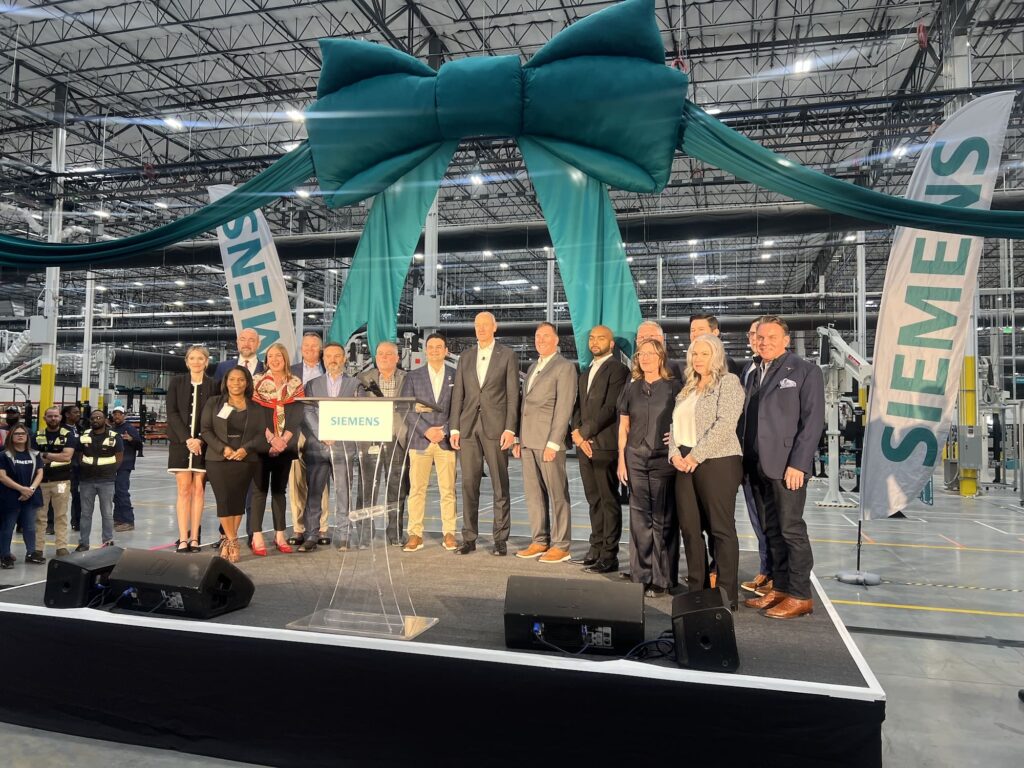
Established Industry Hub. The Fort Worth region is one of the leading aerospace & defense hubs in North America with more than 600 aerospace and defense companies anchored by Bell and Lockheed Martin.
Skilled Workforce. With more than 23,000 aerospace and defense workers and a steady talent pipeline from both universities and specialized training programs at local community colleges, Fort Worth offers a workforce ready to meet industry demands.
Innovative Ecosystem. Fort Worth’s aerospace sector is supported by Texas’ top-ranked education network and more than $250M in federal aerospace R&D. The new Texas A&M Center for Advanced Aviation Technologies further positions the city as a hub for innovation and workforce development.

Strategic Logistics Hub. Home to 55,000 workers, Fort Worth offers unmatched multimodal access at the center of North America. With AllianceTexas, major rail lines, five interstates, and DFW Airport, companies can reach 98% of the U.S. in 48 hours and 200+ global destinations by air.
Business-Friendly Advantage. Mobility and logistics leaders like American Airlines and BNSF thrive in Fort Worth, drawn by no state income tax, low operating costs, and access to top-tier engineering and supply chain talent.
Shaping the Future of Mobility. Fort Worth is at the forefront of innovation with the Mobility Innovation Zone (MIZ) at Alliance Texas—where mobility innovators can test, scale, and commercialize emerging technologies in transportation, logistics, and supply chain automation.
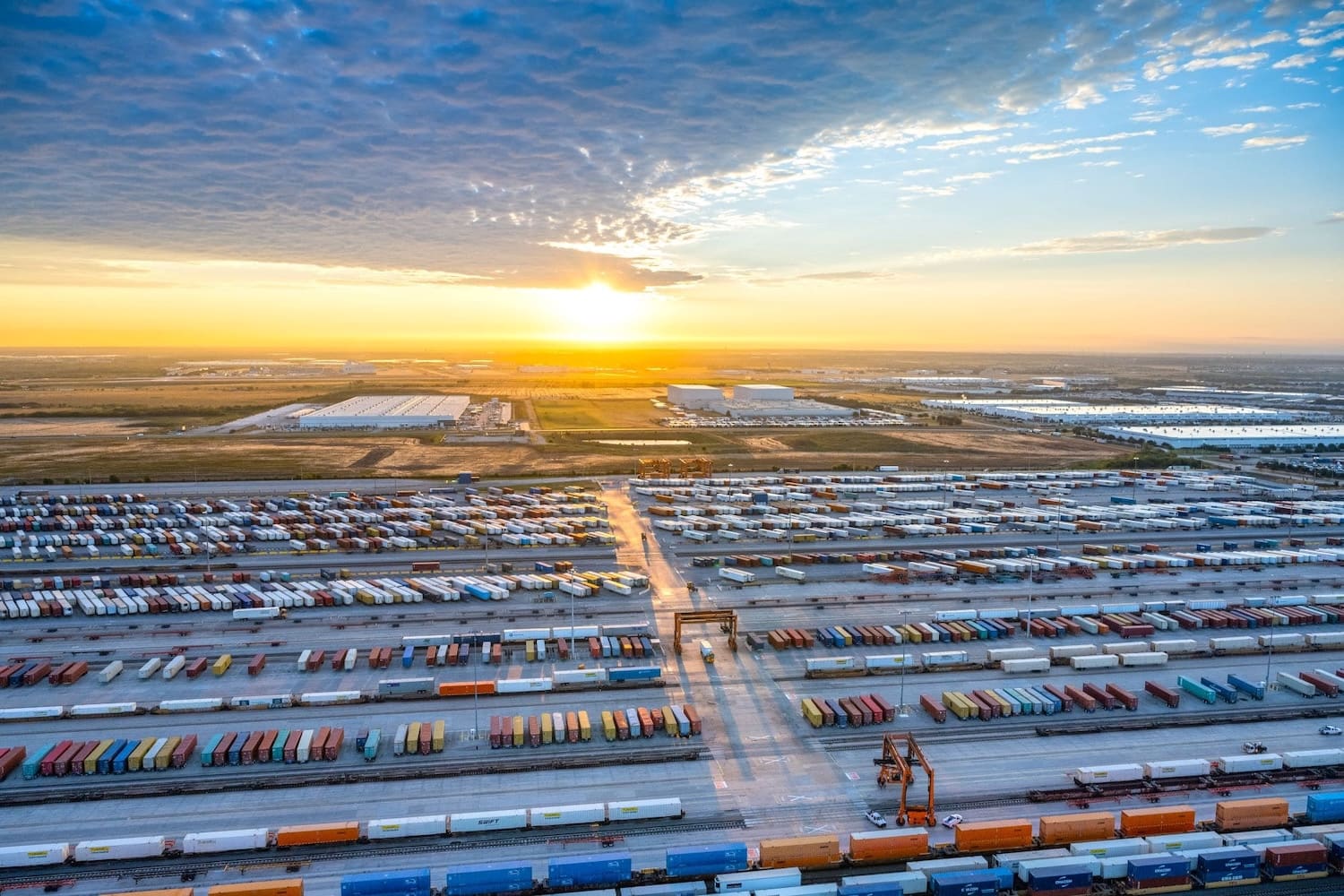
Strategic Expansion Hub. DFW is home to 800,000+ corporate and financial services workers. With a deep talent pool, strong population growth, and a central time zone, Fort Worth offers an ideal location for headquarters, back-office and financial services expansion.
Cost-Competitive Location: DFW financial services workforce ranks second in the nation, trailing only New York; but Fort Worth companies enjoy operating costs 20 to 50% lower than traditional coastal hubs—offering a competitive location without sacrificing talent or market access.
Financial Services Growth. The Fort Worth area’s financial services sector is growing, fueled by major players like Charles Schwab, Fidelity, and GM Financial.
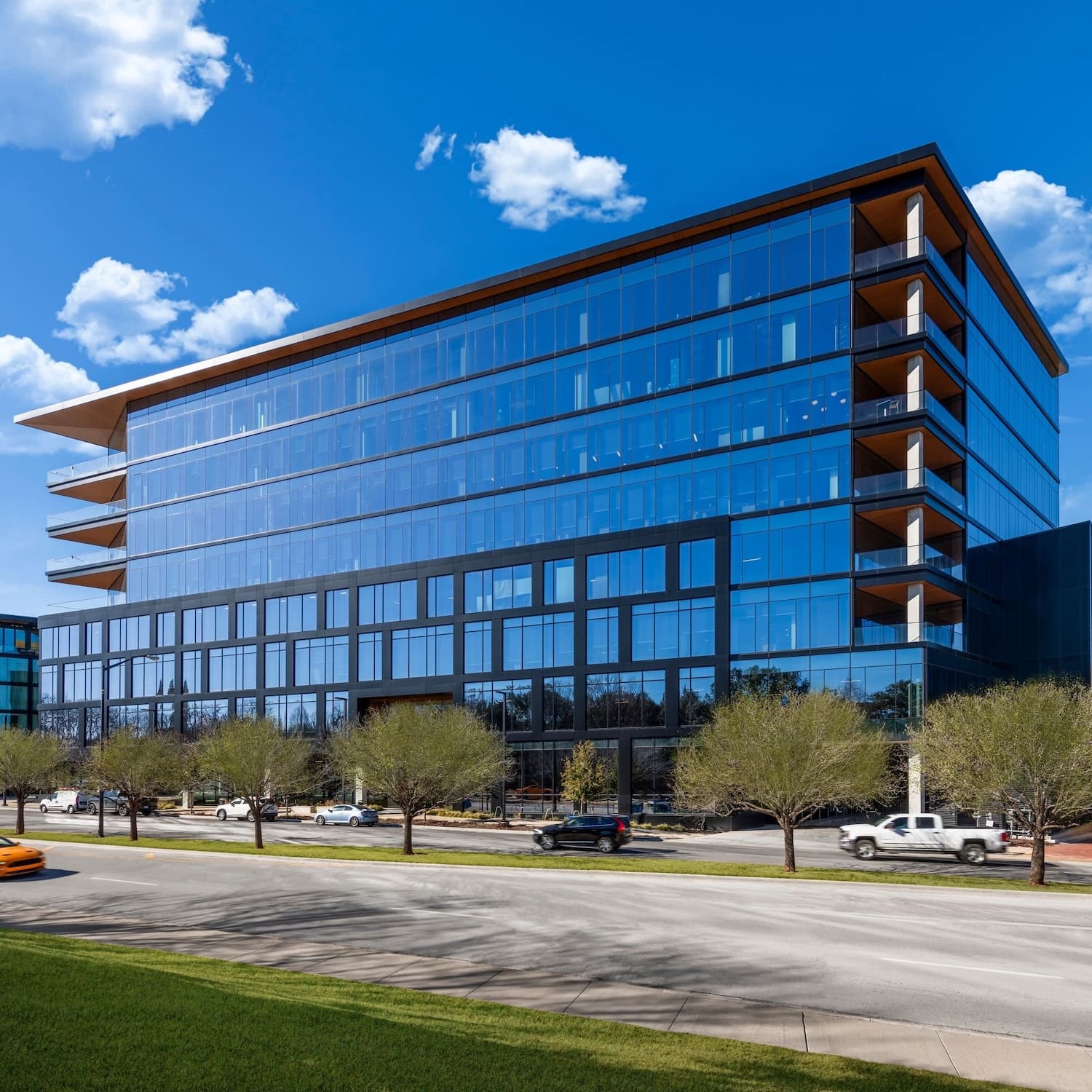
Diverse Energy Ecosystem. Fort Worth is powering the future of energy, from oil and gas to renewables, battery tech, and energy IoT. With roots in the Barnett Shale and innovators like Harnyss and its solid-state hydrogen storage, the city supports a growing energy sector.
Pro-Business Location for Energy Growth. Fort Worth offers unmatched advantages for energy companies, including a strategic central location, no state income tax, and a cost-competitive business environment built to support innovation and expansion.
Texas Leads the Nation. Texas leads in natural gas, electricity, wind, biodiesel, and solar with nearly 1 million energy workers representing 15 percent of the U.S. total and Fort Worth provides direct access to one of the deepest and most skilled energy talent pools in the country.
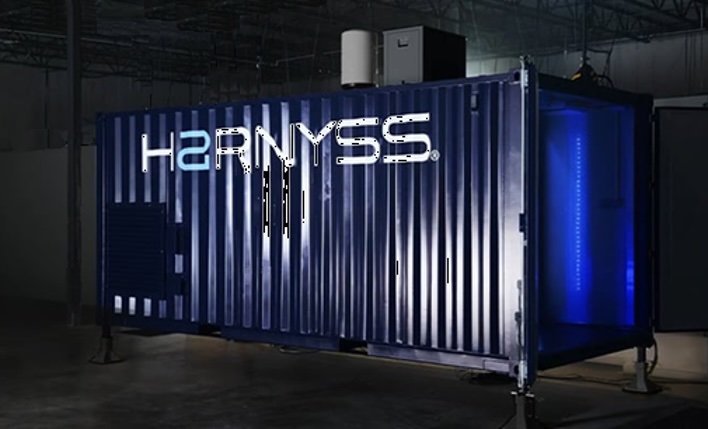
Emerging Life Science Hub. With 34,000 workers in DFW, Fort Worth is at the center of an emerging life sciences industry, with global leaders like Alcon, established medical device companies like Urgo Medical, and biotech startups like Eosera.
Medical Innovation Cluster. Just south of downtown, Fort Worth’s 1,200-acre Medical Innovation District—anchored by the Burnett School of Medicine at TCU and the UNT Health Fort Worth—is emerging as a hub for medical R&D. With the nearby Texas A&M–Fort Worth campus development, the area unites research, education, and workforce development.
Texas Powers Life Science. The Advanced Research Projects Agency for Health (ARPA-H) selected a Texas consortium for one of its three national hubs—with a customer experience hub based in DFW, the area is a growing center for health innovation and biotech investment.
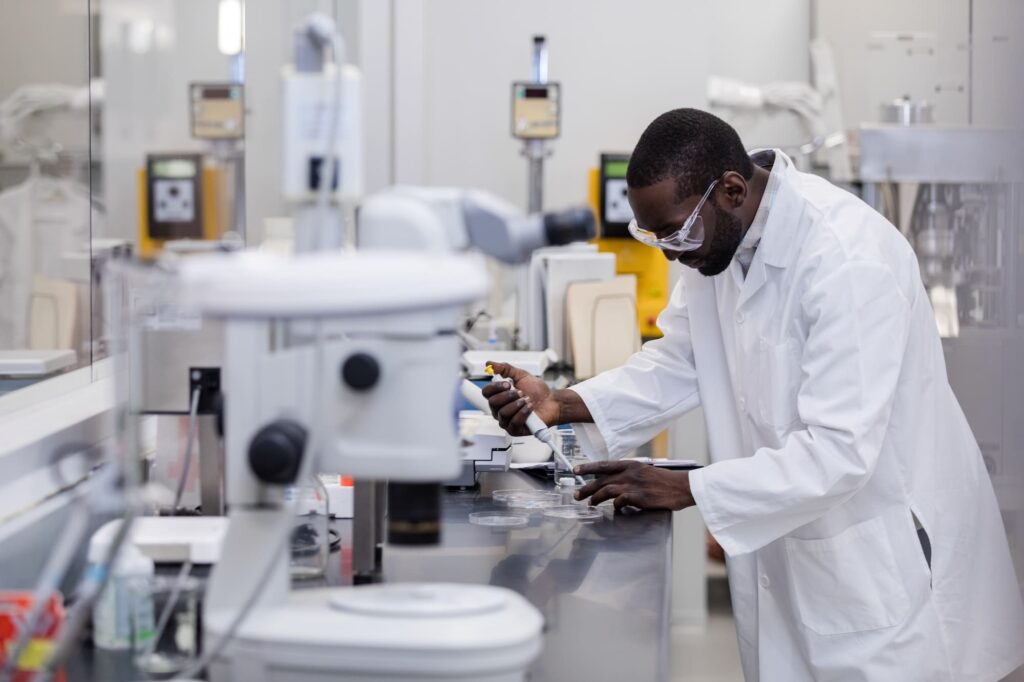
Film-Friendly City. Since the Fort Worth Film Commission’s launch in 2015, Fort Worth has become a go-to for film, TV, and commercial shoots—offering hands-on support and diverse locations. Texas’s new $300M film incentive fund positions the city for more productions.
Fast-Track Talent Pipeline. The Fort Worth Film Collaborative—a partnership between the Film Commission, 101 Studios, and Tarrant County College—is fast-tracking local talent into the industry with training programs designed to meet the rising demand for skilled crew.
Strong Economic Impact. With more than 1,000 productions filmed in Fort Worth, the city’s creative economy has seen a boost of $700 million and 30,000+ jobs created—benefiting everyone from set designers and camera crews to local caterers and carpenters.

Spencer Mitchell
VP of Economic Development
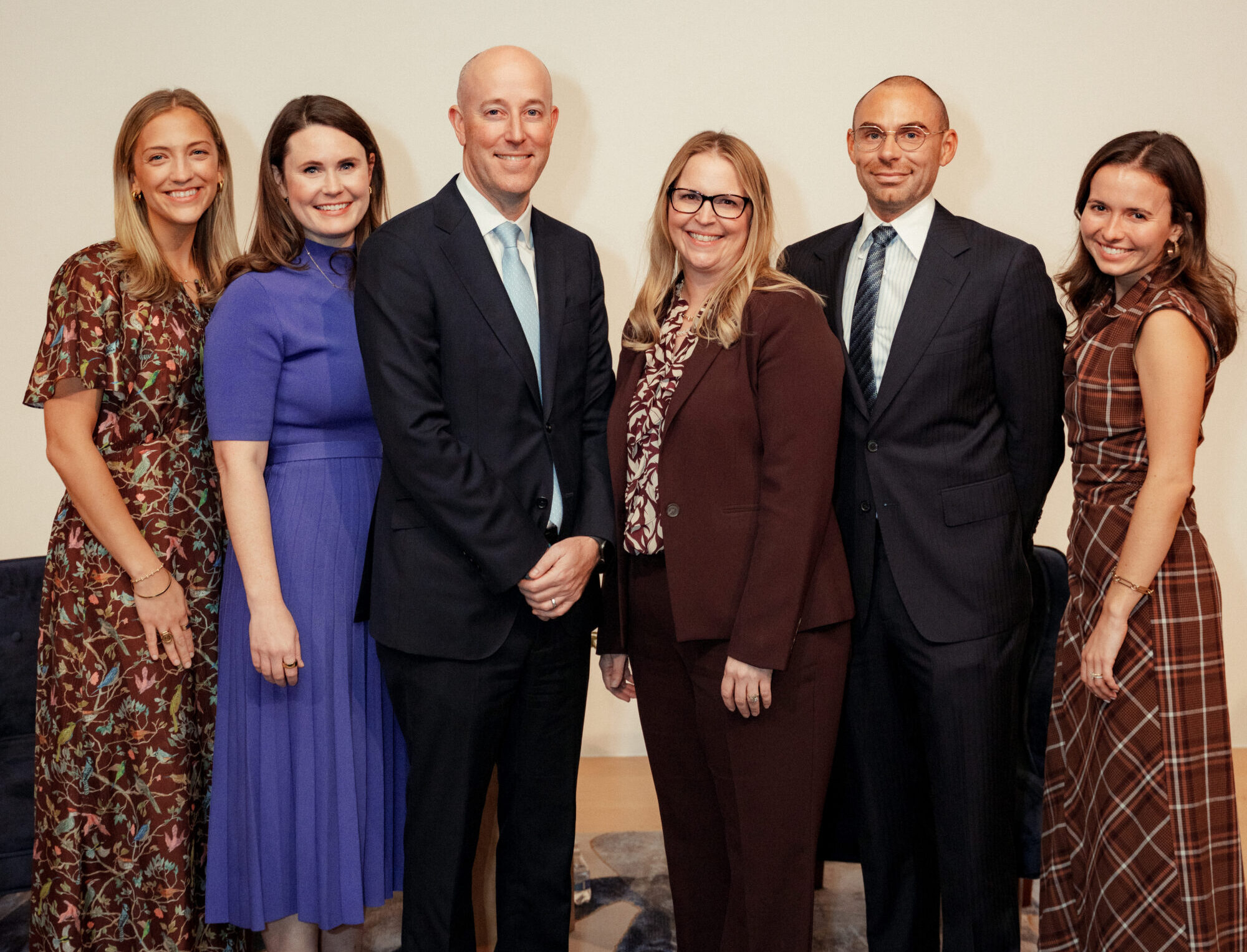
With 1+ million workers in Tarrant County alone, Fort Worth offers direct access to a deep and expanding talent pool.
Fort Worth’s population has grown by 5.9% since 2020, providing companies with a steadily expanding pipeline of talent across industries and skill levels.
Fort Worth’s median age is just 33, ensuring a workforce that’s younger than the national average — ideal for long-term growth and sustainability.
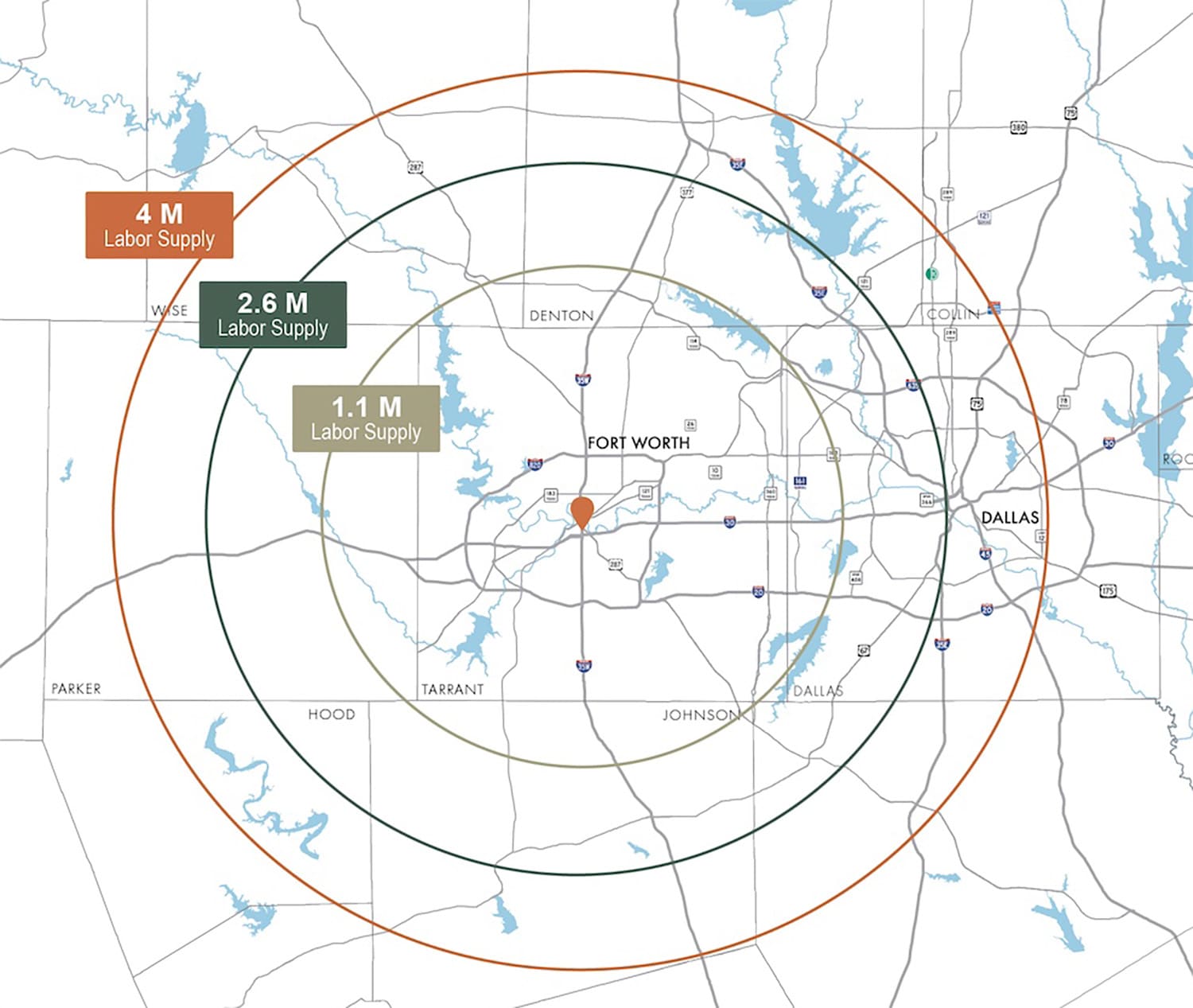
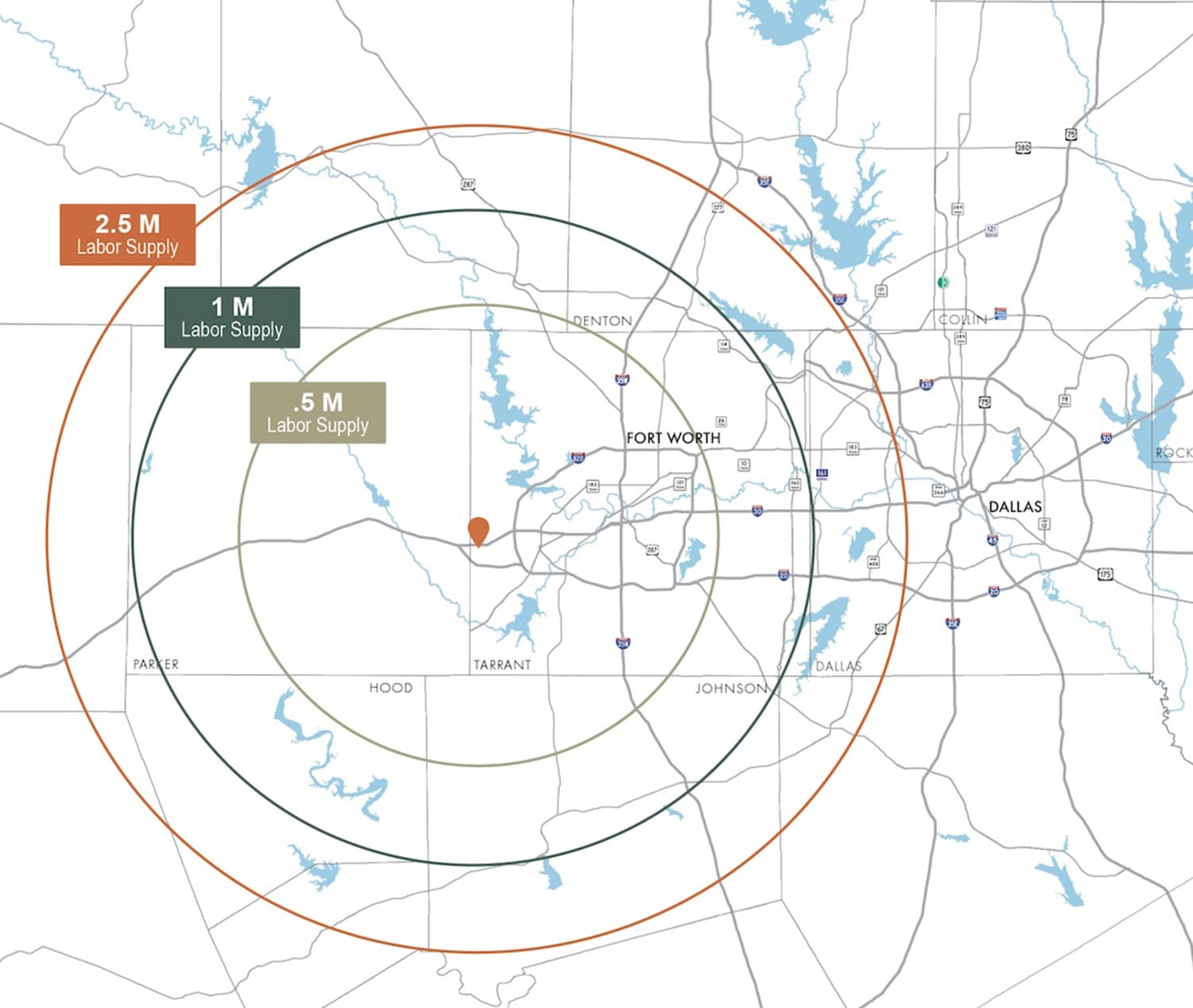
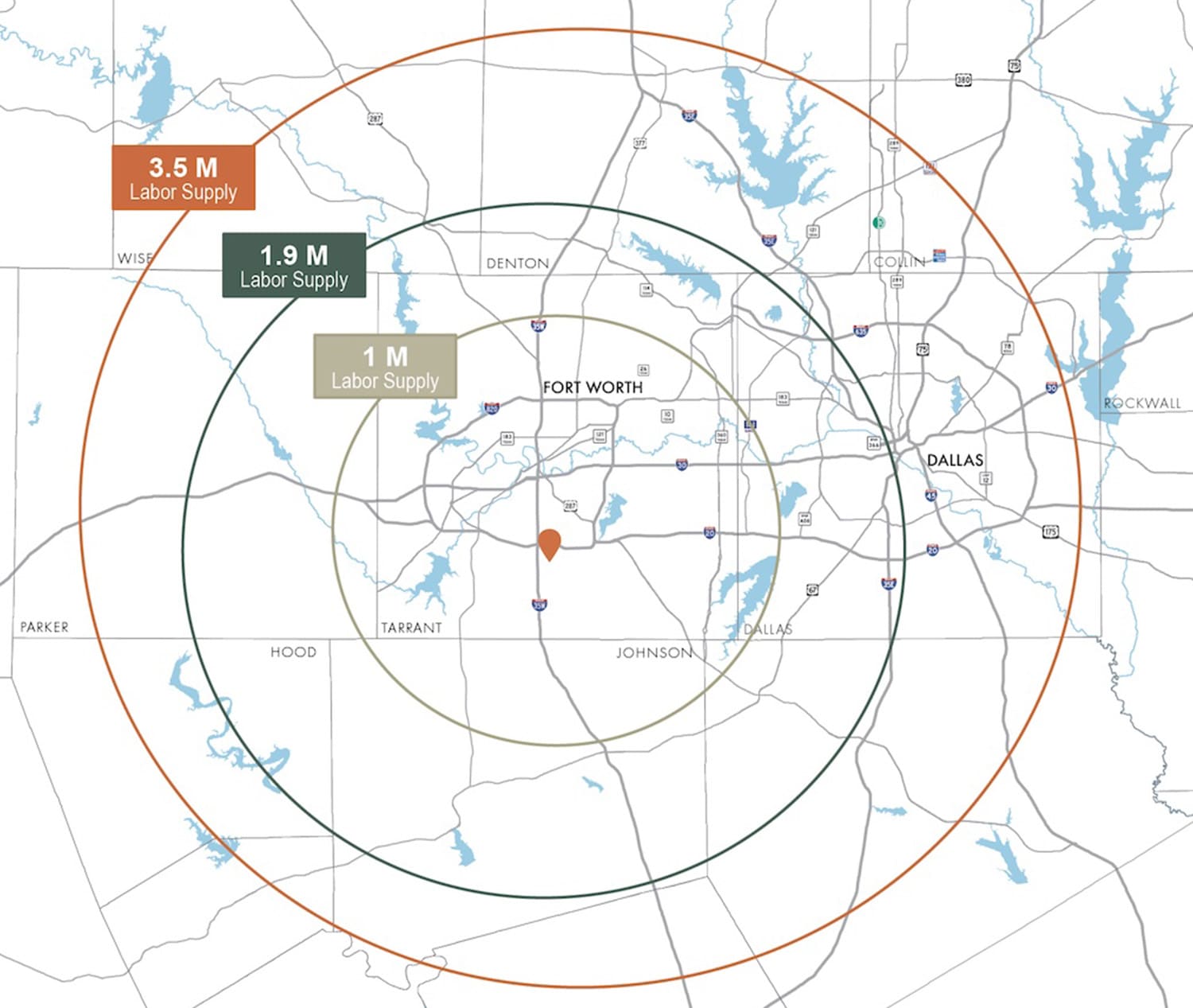
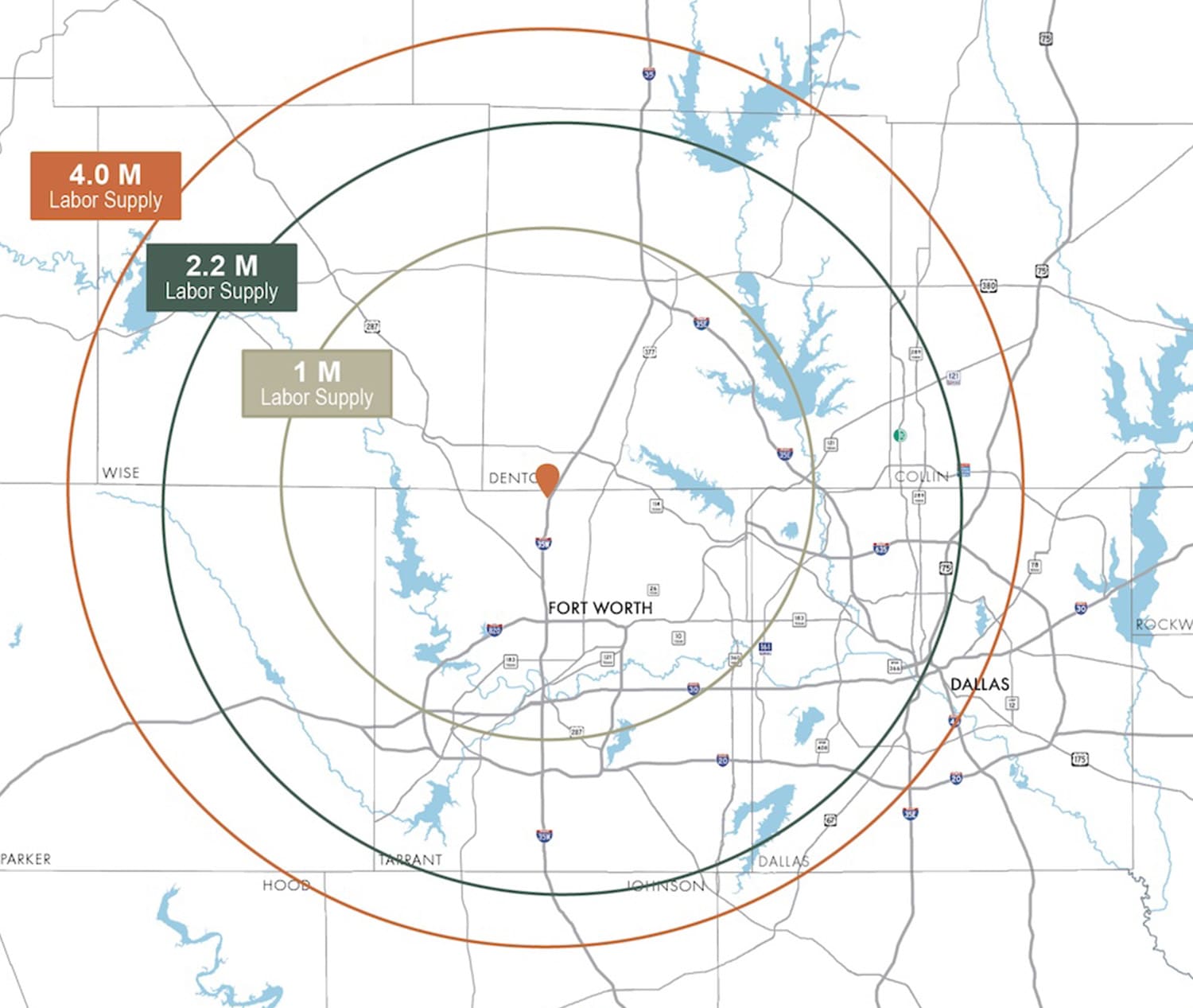
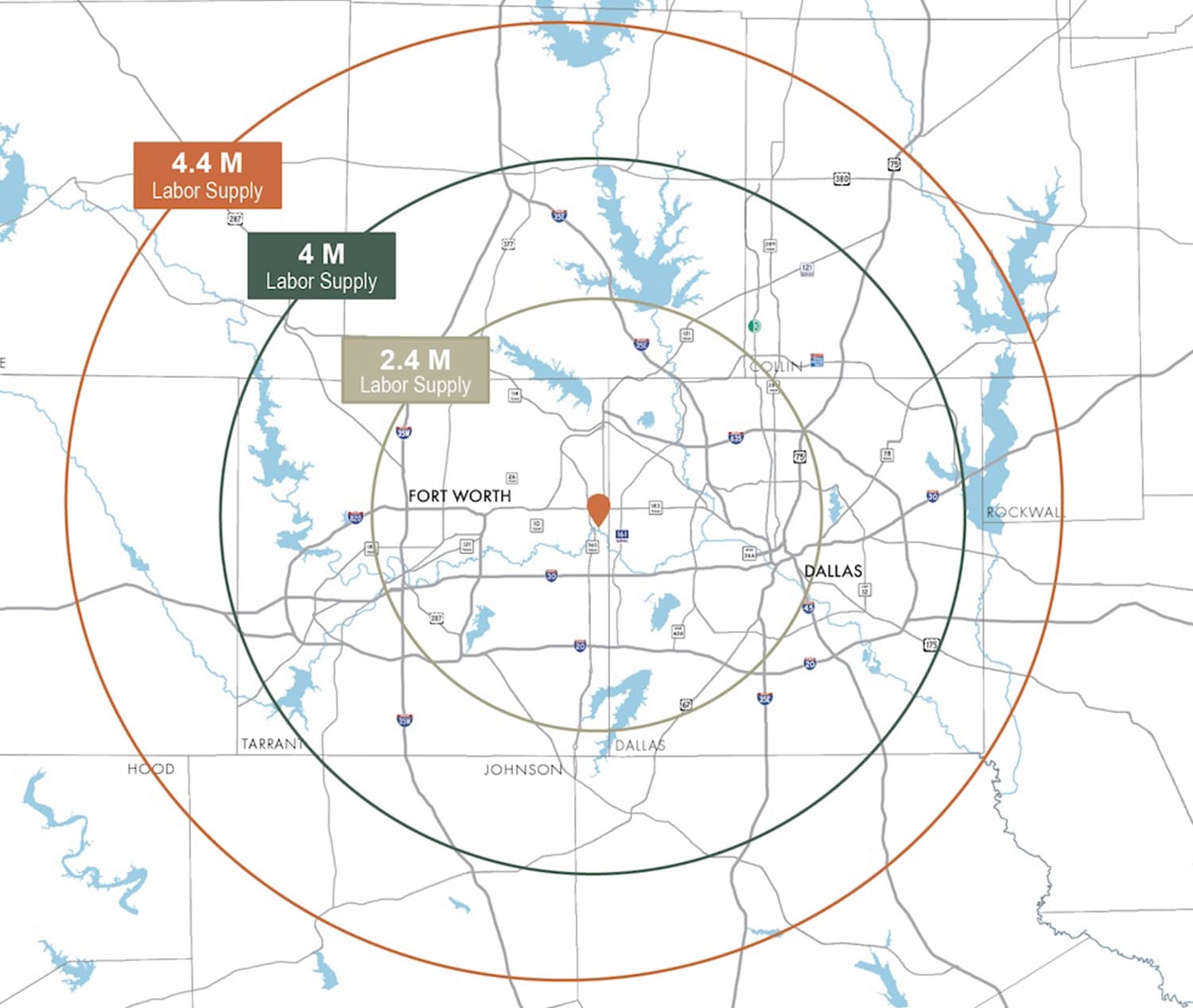
DFW is the #1 region in Texas for higher education enrollment and degree completion—24% of all students enrolled and 26% of annual degrees awarded in Texas are from a DFW area college or university.
Dallas-Fort Worth Higher Education Review (2025)
More than 58,500 graduates earn a bachelor’s degree or higher annually in the Dallas-Fort Worth region and more than 370,000 are enrolled, fueling Fort Worth’s talent base across industries.
Dallas Regional Economic Development Guide (2025)
More than 45,000 students are enrolled at Tarrant County College, where hands-on training for in-demand trades helps supply employers with the skilled talent they need today.
Tarrant County College (2025)
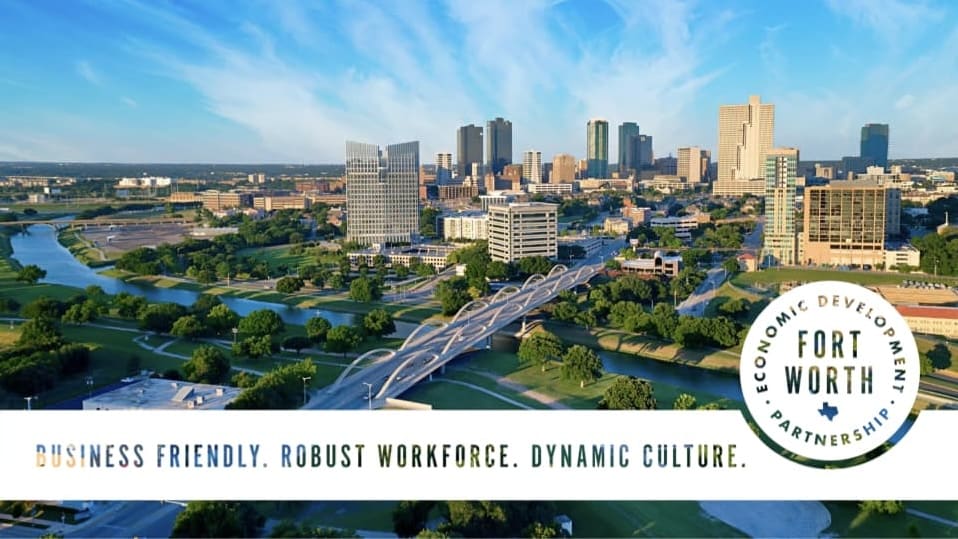
Fort Worth is one of the fastest growing cities offering a lower cost of living than other large U.S. metro areas. Known for our vibrant cultural scene, authentic western heritage, and friendly people, Fort Worth is recognized as one of the best places to live in Texas by Livability.
Known for our vibrant cultural scene, authentic western heritage, and friendly people, Fort Worth was named one of the best places to live in Texas.
Livability (2023)
With a cost of living that’s 3.1% lower than the national average, Fort Worth offers a favorable quality of life with plenty of fun things to do.
C2ER (Q2 2025)
The Fort Worth Cultural District boasts the Kimbell Art Museum, the Amon Carter Museum of Art, The Modern Art Museum of Fort Worth, Fort Worth’s Museum of Science & History, and the National Cowgirl Museum & Hall of Fame.
Visit Fort Worth
From walkable streets to the heart of downtown to suburban areas with room to spread out, to a housing market that is 10.5% less than the national average, there are a variety of options when deciding where to live in the Fort Worth area.
C2ER (Q2 2025)
Fort Worth has plenty of wide-open spaces to enjoy the great outdoors with more than 13,000 acres of green space, including the Trinity River Trails with more than 100 miles of hike and bike trails.
City of Fort Worth, Trinity Trails
From traditional public schools to charter schools, to private or parochial schools, the Fort Worth region offers a variety of schooling options including 21 ISDs in just Tarrant county.
Tarrant County, Texas
Located just outside of downtown is the 120-acre Fort Worth Botanic Garden and Botanical Research Institute of Texas, which offers one of the largest centers for botanical exploration and discovery in the United States.

Fort Worth’s thriving food scene features a diverse, exciting menu of options, from everyday favorites for every palette to two 2023 James Beard semi-finalists: Don Artemio, a fine dining Mexican restaurant nominated for Best New Restaurant, and Goldee’s BBQ, which received a nomination for Best Chef for three of its five pitmasters—and so much more.

The heart of Fort Worth Western heritage can be found at the Fort Worth Stockyards National Historic District. One of the most popular attractions in Texas, the Stockyards feature historic buildings, original brick walkways, twice-daily cattle drives, and recently restored Mule Alley featuring the rustic-luxe Hotel Drover.

Shoppers can enjoy the full range of retail options in Fort Worth—ranging from local shops and boutiques along Camp Bowie, to family favorites in University Park Village, to internationally-renowned luxury options at Clearfork. And don’t forget about handcrafted cowboy boots, hats, and clothing.

Nationally recognized as a top zoo in the United States, the Fort Worth Zoo is home to nearly 7,000 animals that attract approximately one million visitors annually.

Fort Worth nightlife can be found all around town—new developments, like West 7th and the Foundry District, complement redeveloped areas, like Magnolia, the Stockyards, and Near Southside.

Located in Sundance Square, Bass Performance Hall is Fort Worth’s premier venue for national touring artists and Broadway productions, including the permanent home of the Fort Worth Symphony Orchestra, Texas Ballet Theater, Fort Worth Opera, the Van Cliburn International Piano Competition, and the Cliburn.

The National Juneteenth Museum is scheduled to open in 2026 in Fort Worth’s Southside neighborhood. The museum will be the center for education, awareness, and celebration of June 19, 1865.

Ranked as North America’s top (#1) grossing venue for its size by Billboard, Dickies Arena opened in 2019 as a state-of-the-art venue for events of all kinds, including concerts, sports, community events, and the Fort Worth Stock Show & Rodeo.
Courtesy Dickies Arena

Located on the south end of downtown Fort Worth, the 5.4-acre Fort Worth Water Gardens were designed by noted New York architects Philip Johnson and John Burgee and were dedicated to the City of Fort Worth by the Amon G. Carter Foundation.

Let’s talk sites, workforce, and everything Fort Worth has to offer.